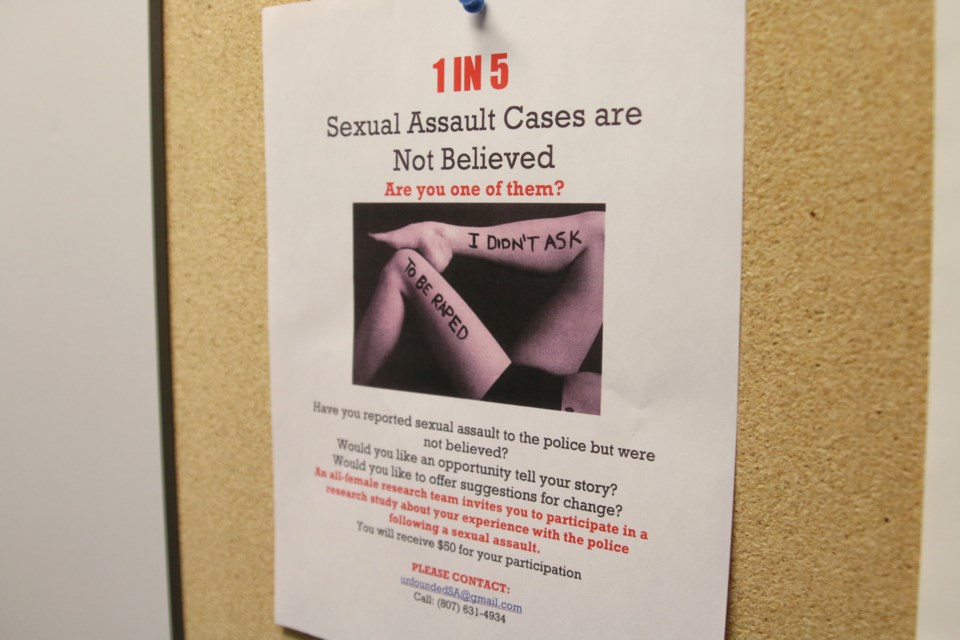THUNDER BAY - Ontario has one of the highest rates of sexual assaults being determined unfounded in Canada and researchers and police in Northwestern Ontario want to find out why that is and what can be done to make it easier for women to come forward after a traumatic experience.
Jodie Murphy-Oikonen, an assistant professor in the School of Social Work at Lakehead University, is the principal researcher in a study that will look at the experiences of women who have been sexually assaulted, have reported the incident to police, and had the allegations deemed unfounded.
“Unfounded essentially means that through the course of the investigation it’s determined that report is false or baseless, so essentially a lie,” she said.
The study received a $57,000 grant from Canada Social Sciences and Humanities Research Council and Karen McQueen in the School of Nursing and Lori Chambers of the Women’s Studies department will be assisting in the research, which will include interviews with sexual assault survivors in Thunder Bay, Dryden, Sioux Lookout, and potentially Kenora.
According to Murphy-Oikonen, the concept for the study came from discussions with members of the Ontario Provincial Police in Dryden.
“They are doing some exceptional work in trying to improve the experience for women who are reporting their sexual assaults,” she said. “They approached me and said they want to make change.”
Det. Staff Sgt. Dayna Wellock, Victim Response Support Unit Northwest Region lead with the Dryden OPP, said a committee consisting of community members reviewed sexual assault cases over three years and revealed various areas that needed improvement, including victim interviews with police.
“It would be helpful for us to have some further research, our responses to be guided by specific research into the area,” Wellock said. “For us in the northwest region that would be extremely helpful. It can only make our job better and it can be a better experience for our complainants.”
In Ontario, 25 per cent of sexual assault cases are deemed unfounded, which is one of the highest rates in Canada. Murphy-Oikonen said research suggests the rate should be closer to one or two per cent.
“Women are deeply affected by the sexual assault and even more impacted when they are not believed by the people they are trusting to protect them,” she said. “The outcomes in terms of health, social, sexual health outcomes, and mental health outcomes are significant for women.”
According to Wellock, every sexual assault case is different and there could be a variety of reasons why an individual case is deemed unfounded. She used the example of third-party reporting from professional agencies that may be required to report possible cases of sexual assault to police but the individual in question does not want to talk about it further.
In September 2018, the classification of founded and unfounded as it relates to sexual assault was revised in the Uniform Crime Reporting Survey with Statistics Canada.
“If we have a case for example of a third party complaint and our victim didn’t want to pursue an investigation, we can now quantify that as a victim declined to continue investigation,” Wellock said. “That gives us a lot more leeway with those kinds of cases whereas before it wasn’t that we didn’t believe him or her, it was the only classification.”
But a change in how sexual assaults are classified is not the issue when it comes to women’s experiences when reporting to police, Murphy-Oikonen said.
“Whether we change the code or not, there continues to be issues with how women are being spoken to, their stories they are sharing, and what is happening with that information,” she said. “At this point in time, we don’t know this is strictly a problem with police interviewing. This is a number of different factors, which is why it’s difficult to speculate at this time.”
The research team began actively recruiting participants earlier this month and Murphy-Oikonen said she was surprised by how quick the response has been. The team anticipates interviewing at least 25 women, though that number could increase.
Researchers will be looking for themes or trends in the interviews with women. Murphy-Oikonen said she believes many women want to see their story told, not only to help themselves but other women as well.
“The women are saying that it is therapeutic for them to just share their story with someone who is believing them,” she said. “They want to make change. Women have consistently said that they hope their story will influence a better experience for someone else who is reporting a sexual assault.”
Participants are still being sought to participate in the study. Interviews are expected to be complete in the next month and analysis of the data completed in the fall with publication of the results to follow.
